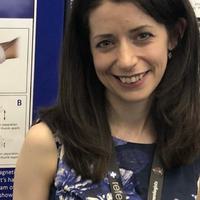Before you watch this webinar
Enhancing your learning experience begins with understanding you better. Collecting data enables us to tailor our educational content specifically for our audience. Discover more about how we handle your information in our Privacy Policy.
Event
Functional neurological symptoms in people with MS
Our sponsor

This activity has been supported by sponsorship from Roche Products Limited. The sponsor has had no control over the educational content of this activity.
MS Academy will host a live webinar on Monday 9th December at 16:00. You are invited to watch the webinar from your computer or tablet. We will be live for 1 hour and 15 minutes via Zoom and a recording will be available following the meeting.
Functional neurological symptoms are very common in people with MS but can be challenging to diagnose and manage.
In this webinar you will follow the diagnostic process of functional symptoms in MS, followed by practical advice on communication and management.
Supported by a multi disciplinary team we hope that this webinar will help you to understand the latest developments in understanding functional neurological disorder, help you to use this knowledge to better communicate with patients, and help you to use that to work with patients to improve their symptoms.
Webinar objectives
- Be more comfortable in diagnosing functional neurological symptoms in people with MS
- Learn about modern understanding of functional neurological disease, and feel more comfortable in communicating this to patients and colleagues
- Feel more confident in supporting people with functional neurological disease to improve their symptoms.
Panel:
Dr Rachel Newby, consultant neurologist with special interest in functional neurological disease
Alexander Philips, FND care advisor, St Georges and South West London and Surrey Neurosciences Network
Lee Drake, physiotherapist with special interest in functional neurological disease
Summary
Functional neurological symptoms in people with MS
Functional neurological disorder (FND) is caused by changes in the brain’s networks, disrupting the normal, automatic neurological sensory and motor pathways. As such, itencompass a wide range of neurological symptoms and signs that result in occupational or social function disability.
In this webinar, Rachel Newby, consultant neurologist at Sheffield Teaching Hospitals NHS Foundation Trust, Alexander Phillips, FND care advisor for South West London and Surrey Heartlands, and Lee Drake, a physiotherapist with a special interest in FND, also at Sheffield Teaching Hospitals NHS Foundation Trust, spoke about the diagnosis and management of FND in people with MS.
What is FND and how is it related to MS?
Outlining the disorder, Rachal said it was often connected to body-directed attention, and encompassed a wide range of sensory and motor symptoms. “There is an under appreciation of how heterogeneous a condition FND is,” she said, adding that predisposing, precipitating, and perpetuating factors vary considerably from person to person.
Depression and anxiety, diagnostic uncertainty, and a history of multiple sclerosis (MS) are common predisposing factors. Drug reactions and pain can precipitate FND, and a belief that MS is causing the problems, as well as negative interactions with healthcare professionals (HCPs) can perpetuate the symptoms.
She explained how the brain makes predictions about sensory feedback, based on previous experiences, and uses this information to minimise prediction error when carrying out a task.In FND, however, there is a breakdown to this “predictive coding” process, leading to a disconnect between expected and actual sensory feedback.
There is significant overlap between FND and MS symptoms, and many patients will be concerned that the FND symptoms are connected to MS progression or relapse. As such, a confident diagnosis and clear explanations are invaluable to patient management, said Alex.
Diagnosis
Diagnosis is based on the history of the symptoms, which tend to have a sudden onset, as well as clinical signs, such as “give-way”, or collapsible, weakness, gait disturbance, and the Hoover sign.
Detecting the Hoover sign involves asking a seated patient to press down firmly with one leg, then the other, and observing limb movement pressure. “When you extend one hip by liftingone leg, the other leg automatically will press down. That's a reflex designed to stabilise the pelvis,” explained Rachel. “In functional disorders, there is a disconnect that we often describe as a software problem.” If pressure is felt under the paretic leg when the non-paretic leg is raised, and no pressure is felt in the non-paretic leg when the paretic leg is raised, the patient is positive for the Hoover’s sign.
Assessing gait can be challenging, as the more the patient concentrates on walking, the more movement is disrupted. Distracting the patient, by engaging the person in conversation as they walk from the waiting room into the clinic, for example, can give the HCP a better idea of the impact, Rachel said. “It’s about shifting their attention away from the action of walking.”
Treatment and management
Patient-centred care involves “looking at all the contributing factors”, said Alex, acknowledging the challenges of managing comorbid MS and FND.
“We need a biopsychosocial approach to treatment that considers all aspects of a patient's life, including mental health and social support,” he said. This will give the HCP an opportunity to address any precipitating and perpetuating factors. Such issues are likely to be vastly different for different people, but may include questions around how well the person is coping with their diagnosis, or how FND is impacting on their family, social, and work life, and mental health.
Many people, he explained, would like to understand the difference between the two conditions, and understand which symptoms to can attributed to each. Providing explanations on FND and its causes can help reassure them, particularly if they have concerns about worsening MS, said Alex.
Physiotherapy is a common intervention for people with symptoms that affect voluntary movement, as well as for those living with MS. However, Lee said there was a “fundamental difference” in how physiotherapists should approach the two conditions.
“For FND, you're focusing on function and automatic movement, rather than the impairment. For MS you're focusing on the impairment and voluntary movement, with strength and exercises.” This approach will not have an affect in FND. “We should be tapping into the functional aspect,” Lee said, recommending early encouragement of weight bearing and functional tasks to foster independence and self-management.
Outlining the FND physiotherapy treatment principles, Lee said it was important to project confidence, and “create an expectation for improvement”. This relies on open communication and education, with the patient and their family, he went on, highlighting the Physio4FMD Workbook 2024 as a useful tool containing symptom models, subjective assessments, and interventions.
Our sponsor

This activity has been supported by sponsorship from Roche Products Limited. The sponsor has had no control over the educational content of this activity.
CPD accreditation
This webinar has been approved by the Federation of the Royal Colleges of Physicians of the United Kingdom for 1 category 1 (external) CPD credit(s).
Chair
 Dr David Paling
Dr David PalingHonorary strategic director & consultant neurologist, Sheffield Teaching Hospitals NHS Foundation Trust
Speakers
 Alex Phillips
Alex PhillipsFunctional neurological disorders (FND) care advisor, St Georges and South West London and Surrey Neurosciences Network
 Lee Drake
Lee DrakeSenior physiotherapist neuro outpatients, Sheffield Teaching Hospitals NHS Foundation Trust
 Dr Rachel Newby
Dr Rachel NewbyConsultant neurologist, Sheffield Teaching Hospitals NHS Foundation Trust
Encouraging excellence, developing leaders, inspiring change
MS Academy was established in 2016 and in that time has accomplished a huge amount with exciting feedback demonstrating delegates feel inspired and energised along their personal and service development journeys. The various different levels of specialist MS training we offer are dedicated to case-based learning and practical application of cutting edge research.